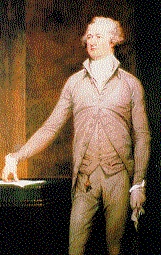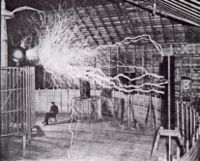Many of you are aware that I have spent the last week writing a paper, in part, on a 19th century murder trial, in my pathetic attempt to rejoin the academic world. This week’s blog was going to be on the Peloponnesian War, but since I have murder on my mind, I thought we’d talk about what I was researching instead. I think you will find this interesting. For your reading pleasure, I have left out all the footnotes!
Christmastime, 1800, in old New York City was cold and bleak. This was at the end of what is sometimes called the little ice age, so the streets were filled with snow. Nights were quite dark, as no one bothers to light the street lamps.
In a boarding house on Greenwich Street, lived a young lady, age 21, named Gulielma Sands. Or Julielma, or Elmore, or Elma. They weren’t quite so priggish about spelling their names as we are now. Let’s call her Elma. The boarding house was run by her relative, Catherine Ring, a Quaker married to Elias Ring, who owned it. A number of other boarders lived there, including Catherine’s sister, a villainous wretch named Croucher -- Richard D. Croucher, to be precise, and a seemingly noble, friendly and sympathetic young man named Levi Weeks, who might also have been a vicious murderer underneath his amiable face.
Levi had made himself quite popular at the house, being very attentive to anyone who was ill, and solicitous to the Ring’s children. Catherine Ring told a neighbor he was more like family than a boarder. Levi, when he arrived, first paid some attention to another boarder, Margaret Clark, but when she was away for a while, began paying attention to Elma.
Although some in the household would later testify that they noticed no special attention paid by Levi to Elma, it became obvious to some of them that there was something going on, and it was presumed Levi was courting her, that they were intimate, and that they would probably get married. Hope Sands, Catherine Ring’s sister, would later testify that she made an effort to catch them in the act one day but failed.
Elma was routinely described as being a cheerful and pleasant person, but she was often sick, and both Levi and another boarder believed she was suicidal, as she at least twice made comments about doing away with herself with the laudanum she would take when ill. Although Catherine was only 27, she treated Elma like a daughter.
Croucher was about 40 years old and apparently quite ugly. His own attorney would later describe him as having an “unfortunate physiognomy”. One day, according to Croucher himself, he was hastily coming up the stairs and surprised Elma, who said “Oh” and passed out. Levi came running out and accosted Croucher, accusing him of insulting her, and not for the first time. Croucher said that he later received an apology from Levi.
On December 14, 1799, George Washington died, and the country was in mourning. Even the recent funeral and carrying on about the Princess of Wales paled in comparison to that outburst of feeling. Day after day the papers were filled with one tribute or another to him, and it seemed everyone with any name wanted to give a memorial address.
While this still going on, on December 22, 1799, Hope Sands confided to Catherine Ring that Elma had told her that she and Levi were to be married that day. Catherine confronted Elma with the news and said she wanted to be there, but Elma said Levi insisted it be kept a secret.
Levi left for the day, and went to his brother’s house. Ezra was a very well known builder, and Levi worked for him as a carpenter. A number of witnesses said that Levi was there all day except for a short, but critical, time.
When 8 o’clock at night approached, Catherine became worried that Levi would disappoint Elma, but Elma was certain he would show, and he did, coming from his brother’s house. Elma went upstairs and Catherine helped her get ready. When Catherine came down, Elma was just ready to leave. She had a muff with her she had borrowed from a neighbor. Catherine came down to the sitting room and stayed with Levi and her husband. Levi got up and left the room, closing the door to it behind him. Catherine heard whom she thought was Elma, coming down the stairs, and then whispering by the front door, which she presumed was the two of them. She heard the very noisy front door open. She went to it with a candle, but because of the darkness and the press of people about, could not see them.
About 10:00 that night, Levi came back and asked for Hope, and then for Elma. Catherine thought this strange, as she believed Elma was with him. She was never to see her relative alive again. When Elma did not reappear Catherine and the others became alarmed. Levi seemed alarmed too. His apprentice, who slept with him, heard him call out her name in his sleep.
A few days after she disappeared, a young boy found the muff in front a drain near a well known as the Manhattan Well. It was created, allegedly as a means to bring fresh water to New York, but the Manhattan Corporation, which built the well, was also a device which allowed its owners to set up a bank, which was not quite so easy as doing so today, and quite important politically. It was the brainchild of Aaron Burr, who is today most famous for having killed Alexander Hamilton in a duel four years later. He was a genuine Revolutionary War hero, and probably saw more action than most of the forefathers we read about today.
Burr was also one of the best lawyers in the country, practicing in the New York bar, which many scholars consider the single best group of lawyers ever to be found in the country. His competition for the top spot was Hamilton. In fact they often tried cases together although they were political opponents. Burr would be elected Vice President of the United States later in 1800, and then destroy his career by killing Hamilton, and later being tried for treason when he and some followers were caught trying to take over Mexico, and possibly taking some of the United States with him.

He has been considered a villainous fellow ever since, although I personally think it is odd that we revere a number of forefathers who were slave holders, but revile Burr for shooting someone who he at least thought was trying to shoot him, and for trying to take over part of Mexico, which was exactly what the United States did several year later on its own (stretching from Florida to California.
When the muff was found, everyone suspected the worst, and finally Catherine Ring confronted Levi, and told him that Elma had said they were going to get married. Levi went to pieces, saying he was ruined. Others in the family had angry words with him. Despite the obvious clue of the muff, it wasn’t until January 2d, 1800 that Elias Ring and a few other men found, and managed to pull Elma’s body out of the well.
The murder created a public outburst and rumors swirled. Levi was immediately arrested although eventually released until a little before trial. One paper called for calm, noting some evidence in Levi’s defense. The body of Elma was displayed at the Ring’s home and even on the street for days.
Fortunately for Levi, his brother, Ezra, was at the time working on a home for Alexander Hamilton (it still exists). He also probably knew Burr and another leading lawyer, Brockholst Livingston, who would later become a Supreme Court Justice, from their connection to the Manhattan Well, for which he had supplied wooden pipes. The three would agree to defend Levi.
It would be impossible to cover Hamilton’s life with any justice in a few paragraphs, and I will not try. Suffice today, he was, a “bastard” child (then, a big deal) from the West Indies, who came to America just before the Revolution and attended what later became Columbia University. He became an artilleryman and then a key figure on Washington’s staff. He led the great charge at Yorktown, which was where this country essentially defeated the British. He went on to become the first Secretary of State, and almost by himself, created the economic path for this country for the next two hundred years, modeling it after Great Britain’s economy to a large degree. He would do great harm to his own career by an affair, which he publicly admitted. He was also considered, with Burr, New York’s top lawyer, and was actually, at the same time, the chief general of the army.

The trial started on March 31st. 75 witnesses were sworn in. Today, it would take 6 months to try the case. They did it in two and a half days, working late into the night, and with the jury sleeping in a room together. 75 witnesses in two days is like playing the whole World Series in an afternoon or washing the windows on the Empire State building in a day.
The courtroom was so crowded, it had to be partially cleared. Chants of “crucify him” could be heard from the street. The court was comprised of Supreme Court Judge, John Lansing, who nearly thirty years later would go out on an errand and disappear forever, likely murdered; the Mayor, Richard Varick, after whom New York’s Varick Street is named, and Richard Harrison, the City Recorder, and one other lesser light.
The prosecution was conducted by Cadwallader Colden, the grandson of a famous New York lieutenant governor, botanist, scientist and historian.

He was 31, and would do battle alone against possibly the greatest team of lawyers’ ever assembled. Unlike the “dream team” of O.J. Simpson’s trial, they were the real deal. There is some evidence that another four lawyers assisted them.
Years later, Colden became an officer in the War of 1812, a New York City Mayor, a United States Congressman, and author of a biography on Robert Fulton, among other achievements. For now, he had his hands full
Colden admitted to the jury that he had a circumstantial case, but that if the jury believed Elma left with Levi, he did not see how they could acquit. He would also show that when Levi left his brother’s house about 8 p.m., he took his brother’s sleigh and with that escorted Elma to her death at the well. He would also produce other witnesses who were passed by a sleigh with a woman and either one or two men in it that night. Witnesses would also testify to screams for help in the night near the well.
He actually did put on witnesses who said all that, some more credible than others. But he also suffered numerous set backs such as having three boys not allowed to testify because they did not read or write and didn’t know what an oath was; another witness just said he did not know anything; and, another, who tried to testify that he saw Levi near the well before the murder testing its depth, was so demolished by the defense that Colden had to say to the court that he gave up the point. One of his key witnesses, who testified she heard Ezra’s sleigh leaving without its bells on the night of the murder, then testified on cross-examination that it was in January, not December.
But worst of all for the prosecution was its choice to put Richard David Croucher on the stand. He immediately made himself odious by testifying in a very pretentious manner. He also admitted to being a snoop, and claimed he caught Levi and Elma in the act together. The cross-examination was devastating. They first pointed out that he was an Englishman, not a very popular thing to be at that time, although this was probably obvious from his accent. They then, after Croucher lied about having no malice towards Levi, proved that they had an altercation and he despised him. He also admitted he had never spoken to Elma since then either.
After an eloquent opening by Burr, the defense relentlessly tore apart the prosecutions case with its own witnesses, and particularly destroyed the prosecution evidence that Elma had been beaten to death. They even offered credible evidence that the one Elma was having an affair with was not Levi, but Elias Ring. Most of all, they succeeded in making the trial about Croucher. It was demonstrated that he not only went about spreading rumors about Levi, but that he had actually passed by the well that night, although he earlier claimed he had only said he wished he had. By the end of the case, the prosecution, on rebuttal, had to put on no less than five witnesses for Croucher to prove his alibi, and he wasn’t even on trial.
The prosecutor begged for a continuance when the last witness was done, claiming he was sinking under fatigue. No wonder. He hadn’t slept in forty-four hours, and was fighting a superb group of lawyers single handedly. There was no adjournment granted, but the case went to the jury without argument. The judge who instructed the jury told them that the court thought that the case was not proved and that an acquittal was in order. Apparently, the jury agreed, as within a few minutes they announced the not guilty verdict.
Levi’s otherwise admirable reputation, demonstrated throughout the trial, led the public from wanting to crucify him to being ecstatic at his acquittal. But, did he do it? Maybe. His own witnesses established that he spent the day at his brother’s house, but left for a little while around 8 p.m. and came back somewhere between 25 minutes and an hour later. There was no doubt that he went to the Ring’s at that time, just when Elma said he was going to show. If he did not go to meet her and then left with her when she came down stairs, why would he walk home, sit for a few minutes doing nothing, and then walk back to his brother’s only to return home again at 10 o’clock? It makes no sense.
Of course, we will never know what really happened, but we do know this – shortly before the trial Croucher had asked the woman he would soon marry if he could take her 13 year old daughter, really an orphan the woman had taken in, home to the Ring house so she could scrub his room in the morning. When they got there he locked her in his room, and then raped her three times during the night, threatening her that if she would not keep quiet, she would end up like the girl in the well. At least this was the testimony of young, Margaret Miller.
Croucher almost immediately thereafter married the mother and began arguing with her to kick the girl out because she was bad. Finally, he told the mother that he knew she was a whore because he had slept with her himself in order to prove it, and that she had consented. Two neighbors confirmed Croucher’s admission, although he claimed it was consensual.
The case was tried in July, 1800. Colden was again the prosecutor, but this time was ferocious on behalf of the young victim. Brockholst Livingston represented the defendant, who he had possibly even cross-examined in the Weeks case (we don’t really know who did what for the defense for the most part).
Livingston, although not so famous as Burr or Hamilton, came from a very famous family. His cousin Robert was the Chancellor of New York who had sworn in Washington when he became President, was crucial in our purchase of the Louisiana territory from the French a few years after the trial, and worked with Robert Fulton on the steam boat. His other cousin, Henry, probably wrote what we call “The Night Before Christmas (see my September 26, 2006 post).

Brockholst himself was an officer in the Revolutionary War, served in an ambassadorial capacity in Spain, was captured during his return, paroled by the British, survived an assassination attempt in 1785, and killed a political opponent, who had caned him and tweaked his nose (I kid you not) in a duel. His legal career would take off after the trial, as he became a New York State Supreme Court judge and then a United States Supreme Court Justice appointed by Thomas Jefferson.
Young Margaret was a great witness, crying her eyes out on the stand. There were only a few witnesses, but the trial report is worth reading because of the powerful summations by Livingston and Colden. It seemed that Colden had grown immensely as a lawyer since the Weeks trial. He did not buckle this time, but was passionate in his own summation. The only question for the jury was – did she consent? The jury thought not, and convicted Croucher.
After being sentenced to life at hard labor a few days later, Croucher made a strange speech to the court, in which he said that he deserved severe punishment, but that he had not had sex with Margaret Miller. The court was not impressed and said not only was it too late for such a claim, but that he had admitted it already to others.
But what did he mean by saying that he deserved to be severely punished. It would be satisfying to believe that he was acknowledging killing Elma Sands, but that is base speculation. What else had he done that was so bad?
According to Hamilton’s son, in an 1865 book about his father, which completely distorted what happened at the trial, Croucher was pardoned, committed a fraud in Virginia, fled to England where it was related he was executed for a heinous crime.
He definitely was pardoned. I was able to get a copy of the pardon document from New York State. The archivist who obtained it for me was probably the first person two lay eyes on it in over two hundred years. Whether he fled to England or not is unknown, but the pardon actually required him to go there. As for his execution, he is not listed in a reference book for which lists notable executions in England or on a website claiming to have all the executions in the 19th century. His end will likely remain a mystery.
Levi Weeks had a better fate. He soon left for Massachusetts but then went down to Mississippi, where he became a very notable architect. Whether he lived with the death of Elma on his head, or whether he tried to forget a horrible event of which he was falsely accused of, we will never know. As much as anyone reading the trial transcripts would like to believe the young and noble Levi was innocent, and the awkward and evil Croucher guilty, I suspect the opposite is true.









